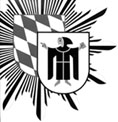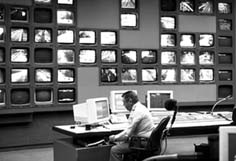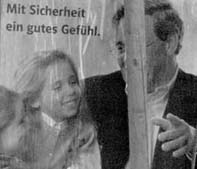 Riskless in Munich -
a special investigation
Riskless in Munich -
a special investigation
a project by Pia Lanzinger within the framework of the Kunstverein München's exhibition
"Exchange & transform (Arbeitstitel)" from 26th April till 1st September 2002
Accompany Pia Lanzinger on her security observations through the city
approx. three till four hours | on Wednesdays
Meeting place: Kunstverein, 13.30
15 May | 22 May | 5 June | 26 June | 10 July | 24 July 2002
Booking (max. 20 people) and prepayment of 5 Euro necessary.
Please contact the Kunstverein:
Kunstverein München, Galeriestraße 4, 80539 München, Tel. 089/221152, Fax. 089/229352, info@kunstverein-muenchen.de
The city map as part of the project is available at the Kunstverein München.
A prevalent phenomenon in the footsteps of deregulation is the
intensified focus on security, from gated communities to what feels like ever-present surveillance cameras in public spaces. Fear of others and of crime in general is playing an increasingly important role in media while politicians talk about the 'right to security'. In this discussion the city of Munich likes to present itself as the most secure city in Germany, with the most secure subway in the world. It was not without pride that the local politicians hosted a security conference earlier this year. The way that phenomena like this are related to self-understanding and the construction of identities is at the core of Pia Lanzinger's work, especially in relation to women. For a number of years she has established collaborations with people from outside the art world, encouraging them to discover and possibly form exchanges with people and phenomena that they normally don't encounter. Workshops and guided tours are formats which usefully combine many of these concerns.For "Exchange & transform (Arbeitstitel)" she is organising a guided tour on the subject of security, on foot and by subway, starting at Kunstverein München and moving around a number of places and institutions in the city centre. During the tour people from various professions who all work within the field of security will talk about their tasks and views on the subject. In the exhibition space Pia Lanzinger will make a bulletin board for her project: a drawing of Munich on the wall will indicate places of interest connected with security and she will add material from the sites and the tours. A specially made city map has also been printed. Maria Lind
Riskless in Munich - a special investigation
Munich is considered the safest city of over a million inhabitants in Europe. The main reason for its comparatively low crime rate is, along with the city,s relative affluence, the high presence of the police and security forces. Anything that could disturb the bright and peaceful picture of the "metropolis with a heart is shunted aside. Homeless people or drug users are driven away from public places, just as are migrants. Those who can afford it hire private security guards, whereby the danger is that a two-class security system could become institutionalised. A well-known example is the notorious black sheriffs who were the first security guards for hire in the German Federal Republic and, because of their violent interventions, fell into disrepute.
Even before September 11th the topic of security had moved to the centre of attention of politics and the media. Although there is no direct connection between personal fear and actual threat, sharper controls are being set up and tougher punishment meted out. In a climate, namely, in which the economic and social changes of globalisation with their tendency to deregulation and flexibility prove unnerving, the popular slogan "law and order can be used effectively in election campaigns.
And with this need for more security, the acceptance of more controls and more surveillance also rises. The location of the Kunstverein Munich, situated among government buildings, business offices, the American consulate and exclusive shops, is one of the best guarded sites in the Republic. Shielded from danger or annoyance, here consumption and culture can be enjoyed in full and the future successfully administered.The armament metropolis of Munich has since 1962 served as the site of the NATO Security Conferences, at which every year high-ranking military officers, armament representatives and politicians meet. At the beginning of 2002 Munich,s centre city was transformed into a high security zone and a comprehensive demonstration ban unceremoniously issued. In the Bavarian capital the quiet and safety of a "millionfold village reigns. And if the worst comes to the worst, there is always the assurance of an insurance. Munich is, namely, the insurance capital of Germany.
Pia Lanzinger(text by Katharina Schlieben, in german only)


